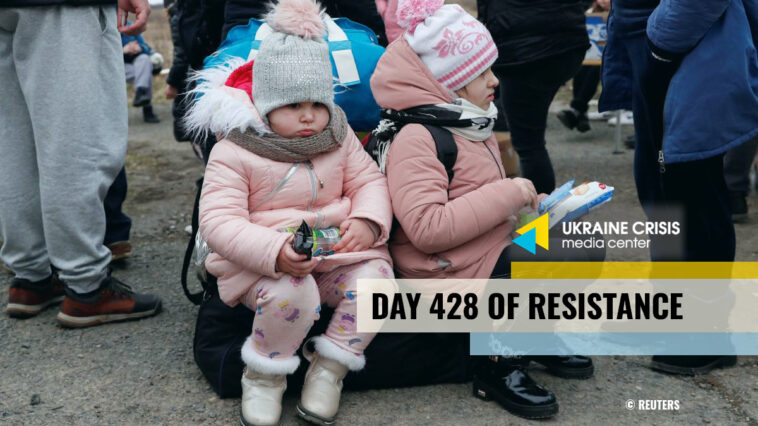PACE recognizes Russia’s deportation of Ukrainian children as genocide. Russia launches missile strike on residential neighborhood in Mykolayiv. Ukrainian troops “in good position” for counteroffensive, have 98 per cent of what’s needed.
PACE recognizes Russia’s deportation of Ukrainian children as genocide
On Thursday, April 27, the Parliamentary Assembly of the Council of Europe passed a resolution that recognizes the forced deportation of Ukrainian children to Russia as genocide. The resolution passed by a vote of 87 to one.
This is the first such document that labels Russia’s action in Ukraine as genocide, a member of the Ukrainian delegation to the Assembly, MP Oleksiy Honcharenko said on Telegram.
According to the resolution, the facts of deportation and forcible transfer of Ukrainian children to Russia fall under the 1948 Genocide Convention.
The Assembly welcomes the International Criminal Court’s decision to issue arrest warrants against the President of the Russian Federation, Vladimir Putin, and the Russian Commissioner for Children’s Rights, Maria Lvova-Belova.
The resolution supports the need for thorough recording, gathering and assessment of evidence of the crime of genocide.
The Assembly calls on the International Criminal Court to examine the possible prosecution of the crime of genocide as regards Russia’s actions towards Ukrainian children currently within its hands and encourages States Parties to consider bringing prosecutions for all crimes within their national criminal courts where jurisdiction is possible.
The resolution calls on the international community to strengthen co-operation with the European Union in order to stop the crimes of deportations of Ukrainian civilians by the Russian Federation.
Russia launches missile strike on residential neighborhood in Mykolayiv
A Russian missile strike on Mykolayiv early Thursday killed one person and injured 23 others.
Russia bombarded the city with four Kalibr missiles, head of the joint press center of the Defense Forces of Southern Ukraine, Natalia Humenyuk said.
The missiles were launched from the Black Sea, according to the spokesperson for the Operational Command South, Vladyslav Nazarov.
“The enemy struck Mykolayiv overnight with Kalibr missiles launched from the Black Sea. [Russia fired] four missiles, using particularities of the landscape and changing their trajectory to complicate the detection,” Nazarov said, posting on Telegram.
He added that “considering the fact that these are high-precision weapons that hit targets based on coordinates, it is an obvious fact of terror of civilian population”.
These are the first such attacks on the city since the New Year, Mykolayiv mayor Oleksandr Senkevych told Radio Free Europe/Radio Liberty. “People were caught off-guard, there was slight panic,” he said. He added that there were no military facilities near where the missiles landed.
Ukrainian troops “in good position” for counteroffensive, have 98 per cent of what’s needed
Nearly all the combat vehicles Ukraine’s Western allies promised to deliver in time for the counteroffensive have arrived, Commander of the U.S. European Command, General Christopher Cavoli told the U.S. House Armed Services Committee during a hearing.
Cavoli said they “sat down with our Ukrainian colleagues” and figured out what aid they’ll need for their offensive: “We checked it a couple of times, and we gathered it from our allies, who were very generous, especially with regard to tanks and armored fighting vehicles. And we have been shipping it into the country.”
“Over 98 percent of the combat vehicles are already there,” he said.
“According to the modeling that we’ve very carefully done with them, the Ukrainians are in a good position,” Cavoli said.
On Thursday, April 27, NATO Secretary General Jens Stoltenberg released similar information, saying that “more than 98 per cent of the combat vehicles promised to Ukraine have already been delivered”. He added that “this will put Ukraine in a strong position to continue to retake occupied territory”.
Allies’ willingness to continue to provide assistance to Ukraine will largely depend on whether Ukraine’s counteroffensive is successful, Ukrainian Defense Minister Oleksiy Reznikov said. He said he disapproves of the vivid discussions around the counteroffensive, but he understands the reasons for it. People want victory, he added, while the allies have come a long way from supporting Ukraine so that it can survive to investing in the victory. At the same time, Ukraine’s allies are committed to supporting the country until it prevails.
Why some European countries want to impose ban on Ukrainian grain? Ukraine in Flames #413
In mid-April Poland, followed by Hungary, Slovakia and Romania, imposed a temporary ban on the import of grain and some other types of agricultural products from Ukraine. The governments of these countries claim that local farmers suffer losses due to the supply of Ukrainian agricultural products to their domestic markets. This came as a shock for Ukraine and its farmers, as agricultural exports account for 70% of Ukraine’s foreign exchange earnings from commodity exports. Watch Ukraine in flames #413 to find out about the temporary ban on Ukrainian grain and why it suddenly became so divisive in Europe.
Guests:
- Iulian Chifu, State Counselor of the Prime Minister for Foreign Affairs, Security and Strategic Affairs, Romania
- Denys Marchuk, Deputy Chair of the Ukrainian Agrarian Council




